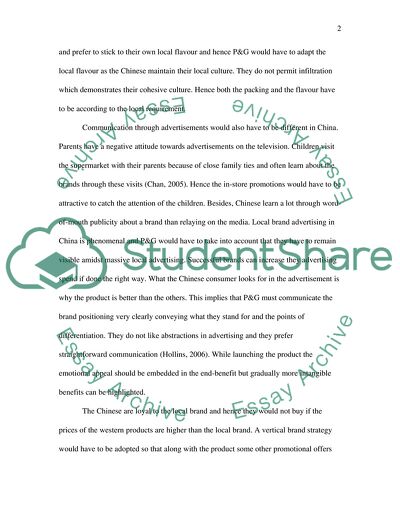
- Home
- Free Samples
- Premium Essays
- Editing Services
- Extra Tools
- Essay Writing Help
- About Us
- Studentshare
- Subjects
- Miscellaneous
- Business Communication
Business Communication - Essay Example

- Subject: Miscellaneous
- Type: Essay
- Level: Masters
- Pages: 4 (1000 words)
- Downloads: 0
- Author: ukuhlman
Extract of sample "Business Communication"
ed with enthusiasm by the Chinese but even FMCG brand like Proctor & Gamble’s shampoo would have to be altered to local culture to gain access to the market The Chinese culture is based on relationship marketing or guanxi as it is known in China. The focus thus has to be on the people and the organization rather than on the products and services. Guanxi focuses on social relationships while the relationship marketing in the West would focus on the symbols, images and brands (Arias, 1998). Chinese culture is based on cooperation rather than cooperation.
Chinese are usually reluctant to try new brands but if a customer has been satisfied and recommends a brand they would try it. The Chinese create an emotional bond with any brand and hence it would be advisable to appeal to their emotions. In the case of daily use products they do not look for brand but focus on price and quality but they do spend on entertainment, leisure, health and fitness (China, 2007). Hence P&G shampoos if marketed in China could achieve success if marketed by appealing to their emotions.
The packaging would have to carry Chinese characters as only English print on the packaging would not go well with the people. The Chinese are very taste-conscious and prefer to stick to their own local flavour and hence P&G would have to adapt the local flavour as the Chinese maintain their local culture. They do not permit infiltration which demonstrates their cohesive culture. Hence both the packing and the flavour have to be according to the local requirement. Communication through advertisements would also have to be different in China.
Parents have a negative attitude towards advertisements on the television. Children visit the supermarket with their parents because of close family ties and often learn about the brands through these visits (Chan, 2005). Hence the in-store promotions would have to be attractive to catch the attention of the children. Besides, Chinese learn a lot through word-of-mouth
...Download file to see next pages Read MoreCHECK THESE SAMPLES OF Business Communication
Technology and Business Communication
Business Communication and Technology
Business Communication Writing
International Business Communication Situations
Intercultural Business Communication
Global Business Communication Issues
Non-Verbal Communication in the Business, Information and Communication Technology
Business Communication in Google

- TERMS & CONDITIONS
- PRIVACY POLICY
- COOKIES POLICY